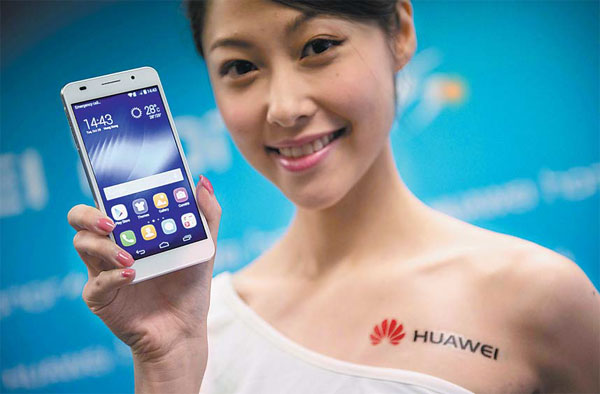Home brands ring louder overseas
Even though China's top 10 largest mobile phone exporters were still the international brands such as Apple and Samsung and their original equipment manufacturers, Chinese mobile phone manufacturers - led by TCL, ZTE and Huawei - saw their market share increase by 1.3 percentage points to 7.9 percent in 2014, according to the General Administration of Customs.
TCL Communication Technology Holdings Ltd came 11th on the list, while Huawei Technologies and ZTE Corp were in 13th and 14th place in terms of their export volume.
Xiaomi Corp roared ahead in 2014, with its ranking jumping to 37th place in 2014 from 69th a year earlier. Its export value increased more than nine times last year and the volume of its exported mobile phones shot up almost 20 times year-on-year.
|
A promoter displays one of the latest smartphones from Huawei, the Mate 7, during its launch in Kuala Lumpur, Malaysia, in November. The Chinese telecom company is among a growing number of Asian brands that are challenging Apple's and Samsung's worldwide dominance. Provided to China Daily |
"Better experiences of mobile phone applications and operating systems have become the major reason for consumers to opt for phones made by Chinese companies," says Geng Yan, general manager of the Internet industry research center of CCID Consulting.
Coolpad Group Ltd saw its sales revenue in overseas markets increase by 300 percent in 2014 to reach 2 billion yuan ($319 million) in 2014. For Coolpad, which has businesses in the United States, Europe and the Asia-Pacific, this year will be crucial for the company in terms of overseas expansion, as it aims at achieving an annual growth rate of 100 percent in the next three to five years.
Based on Lenovo's sales numbers in the first three quarters provided by consultancy firm IDC, it is estimated that the company could have sold at least 90 million mobile phones in 2014, including sales of Motorola smartphones, which Lenovo acquired for $2.9 billion in 2014.
Yang Yuanqing, chairman and CEO of Lenovo Group Ltd, said in an earlier interview that the acquisition of Motorola Mobility helps provide Lenovo with opportunities to enter markets outside China, including North America, Latin America, the Middle East, Africa, and the rest of Asia. Motorola has also had extensive operations with the world's top 50 operators.
More importantly, Lenovo will be able to obtain the 2,000 patents that Motorola holds. For most Chinese companies, the lack of patents makes it very difficult to enter mature markets such as North America, Western Europe and Japan.
According to figures provided by TCL at the beginning of this year, the company sold a total of 73.49 million mobile phones in 2014, 85 percent of which were in the ever-growing overseas market.
TCL was one of the first Chinese mobile phone makers to venture overseas. By acquiring Alcatel's mobile phone business in 2004, it has rapidly upgraded in terms of backup technology. Meanwhile, its distribution channel of operators has largely been boosted by Alcatel's overseas network.
ZTE has long been the largest Chinese mobile phone vendor in the United States by working closely with local operators. By the end of 2013, more than 95 percent of its phones sold in the US were completed by operators, among which AT&T took the lion's share by selling 53 different models of ZTE phones.
Huawei sold 75 million mobile phones in 2014, among which 40 percent were sold in overseas markets. Emerging markets such as the Middle East, Africa and Latin America saw the volume grew threefold last year. Apart from the US, Huawei has sought cooperation with 45 of the world's leading operators.
Xiaomi undoubtedly grew the most rapidly last year. It sold 61.12 million mobile phones in 2014. According to the third quarter report of 2014 provided by market research firm StrategyAnalytics, Xiaomi's shipments of smartphones as well as its market share rose to third place globally, only after Apple and Samsung.
Southeast Asian countries were its major targets in terms of exploring overseas markets.
According to the General Administration of Customs, China exported 1.31 billion mobile phones in 2014, up 10.6 percent year-on-year. The total value of exports surged 21.3 percent from a year earlier to $115.3 billion by the end of last year.
Last year also witnessed the first time that mobile phones have overtaken laptops and tablets in terms of export value in China.
Exports to the Middle East and Africa increased the most rapidly in 2014. More than 43 million mobile phones were exported to the Middle East last year, up 67.75 percent than in 2013. The value of exports grew 68.61 percent to $3.64 billion.
The number of mobile phones exported to Africa soared 59.78 percent to reach 25 million, with the value of exports up 65.96 percent to $1.21 billion.
The United States remained the largest overseas market for Chinese mobile phones. A total of 130 million mobile phones were shipped to the US, up 20.24 percent year-on-year, with its value of exports increased by 24 percent to reach $24.9 billion.
Even though the growth rate contracted slightly in the European market, Chinese manufacturers still managed to ship 129 million mobile phones to Europe, up 3.79 percent year-on-year. The value of exports increased 13.83 percent to $17.95 billion.
shijing@chinadaily.com.cn



















